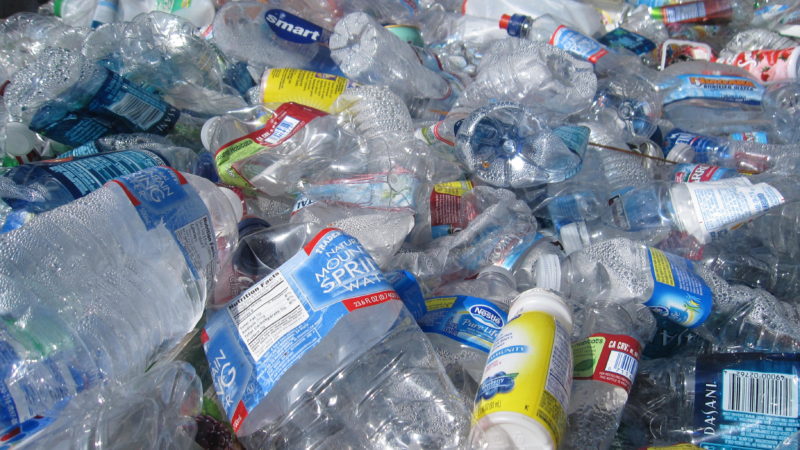"The recycling industry, heralded as a success by environmental organisations, has failed to ensure that the jobs it promised are decent."

Greenpeace’s exposés of rubbish dumps in Malaysia and a recycling plant in London shows how the growth of this green industry is built on exploitation.
The stories – involving workers in the global South and poorly-paid, often migrant workers in the UK – form a lesson to the environmental movement that workers’ rights need much greater priority.
Workers at a West London recycling plant have to meet demanding targets on less than the living wage, on insecure contracts, and working in filthy conditions alongside rats and cockroaches. They work under constant surveillance, threatened with dismissal if they do not meet the targets.
These conditions highlight how the recycling industry, heralded as a success by environmental organisations, has failed to ensure that the jobs it promised are decent.
Greenpeace’s report pays more attention to the incorrectly sorted rubbish as a result of these conditions, rather than the workers. Yet failing to respect rights leads to ineffective work, and this work is critical in the age of climate crisis.
A previous report highlighted how UK consumer waste ended up in Malaysia where it was overwhelming local recycling facilities. The fact that the population as a whole has engaged in significant behaviour change, sorting their rubbish regularly, means that recycling has succeeded where other environmental measures have failed to win public buy-in. But the understandable outrage of seeing materials that the public has sorted not actually being recycled risks undermining public trust in environmental measures more broadly.
The early visionary days of recycling heralded a different future. Cooperatives sprang up, who had a strong vision for locally sustainable economies. However, as recycling grew, these organisations had to compete on the market with large multinationals. The industry has since been subject to the horrors of neoliberal profit-driven practice.
Migrant labour now underpins the dirty, dangerous work in this sector – of those employed by recycling giant Biffa’s suppliers, 98% are migrants. Biffa was also recently convicted of breaking the law by sending household rubbish to China that was labelled as waste paper.
Workers in recycling face significant health and safety challenges. There are 7.22 deaths per 100,000 workers in the sector – a rate 16 times the average. And a study found that 47% of public authorities failed to meet monitoring standards for health and safety performance in waste services.
It was in response to “inhuman working conditions” that a small group of Peruvian workers in Newham walked off the job in a historic wildcat strike, March 2018. They demanded basic protective equipment, soap, toilet paper, and a living wage and sick pay. Supported by the United Voices of the World, their collective resolve brought quick results.
We must hardwire respect for workers’ rights as a fundamental building block of a green transition. Leaving it to the vagaries of the market means Western consumers will continue to depend on the exploitation of migrant and overseas workers.
We need to rebuild the public realm as the best vehicle for delivering public goods, acknowledging the many ways that the profit motive undermines social and environmental goals. Recycling shows us how it has literally resulted in sorted recycling being sent for incineration and being dumped on the global South. Public-Common Partnerships offer an innovative new way of thinking about how public goods can be delivered with greater democratic participation.
Most of all, environmental transformation cannot be driven by well-intentioned middle-class home-owners in the global North – instead we must centre those already marginalised, recognising they are the primary agents of change. To be successful, this must break out of the green silo and learn from movements in the global South, not least how to build power.
A green new deal must also recognise that the UK’s wealth is built upon a bloody legacy of colonialism. We cannot let imperial nostalgia become the accepted goal for the UK; it would pave the way for a new wave of green colonialism that replicates patterns of exploitation. Instead we must put forward an alternative vision of international solidarity and cooperation, fund mitigation efforts in poorer countries, and cover the massive costs of adapting to a changing climate.
If the exposé of waste recycling ending up in Malaysia, and rat and cockroach infested exploitative workplaces in west London, are to mean anything, they should mark a moment where the environmental movement starts to address how neoliberalism is fundamentally undermining the struggle for a sustainable planet, and in its place call for the radical transformation driven by movements of those most affected that is so urgently needed.
Owen Espley is a senior labour rights campaigner at War on Want.




4 Responses to “The dark side of recycling – and why a Green New Deal must strengthen workers’ rights”
Transition away from fossil fuels must be fair to workers, say unions | Left Foot Forward
[…] investigation by Greenpeace recently showed that workers at a recycling plant in West London were not being paid living wage and were set […]
Mark Porciani
We need a regulations of recycling standards by Local Authorities.
Twining smaller authorities together to ensure this is maximised. Fines for dumping. Also, am introduction of local taxation to supermarket who don’t transform there shops into a single use plastic free zone.
Linda Davsi
Plastic production is increasing as oil prices fall and the returns on recycling are reduced. Those producing the ‘use once’ plastics should pay the costs and recycling should take place within the borders of each country not exported to less developed nations. A travesty.
Linda Davis
Plastic production is increasing as oil prices fall and the returns on recycling are reduced. Those producing the ‘use once’ plastics should pay the costs and recycling should take place within the borders of each country not exported to less developed nations. A travesty.